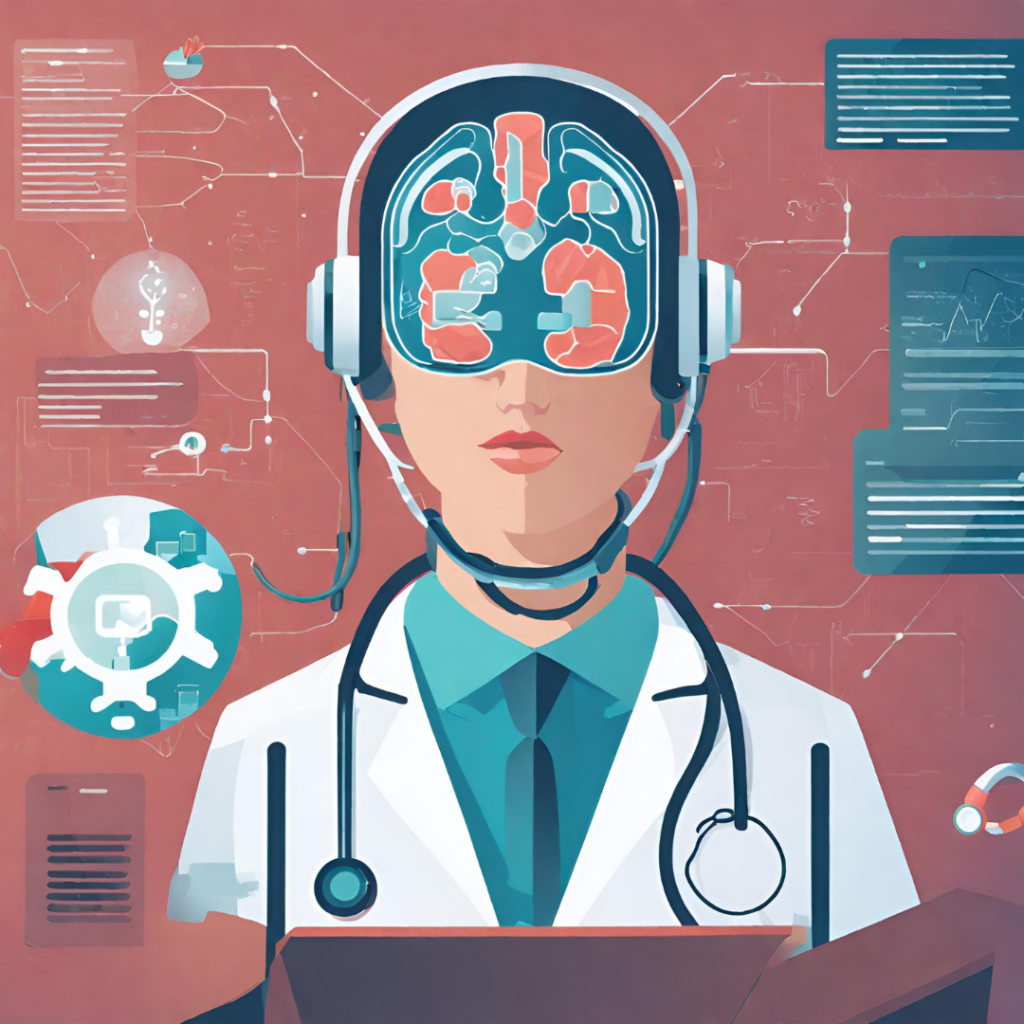Great Health Great Fitness
“The Future of Healthcare: AI, Robotics, and Digital Health Empowering Patient Care”
AI, Robotics, and Digital Health Empowering Patient Care" delves into the transformative potential of advanced technologies in reshaping the healthcare landscape. From AI-driven diagnostics to robotic-assisted surgery and digital health solutions, this exploration highlights how these innovations are revolutionizing patient care, improving outcomes, and paving the way for a more accessible and personalized healthcare experience.


The landscape of healthcare is undergoing a profound transformation, propelled by advancements in artificial intelligence (AI), robotics, and digital health technologies. In this exploration, we delve into the promising future that awaits the healthcare industry, revolutionized by these cutting-edge innovations.
Artificial intelligence, in particular, is playing a pivotal role in transforming healthcare by leveraging data analytics and machine learning algorithms to uncover valuable insights from vast amounts of medical data. AI-powered diagnostic tools can analyze medical images, such as X-rays, MRIs, and CT scans, with unprecedented accuracy, aiding clinicians in early detection and diagnosis of diseases. Moreover, AI-driven predictive analytics models can identify patterns and trends in patient data, enabling healthcare providers to anticipate and intervene in potential health issues before they escalate.
In addition to AI, robotics technology is also making significant strides in healthcare, with applications ranging from minimally invasive surgery and rehabilitation to logistics and patient care. Surgical robots, equipped with advanced imaging systems and precision instruments, enable surgeons to perform complex procedures with enhanced dexterity and precision, resulting in shorter recovery times and improved patient outcomes. Furthermore, robotic exoskeletons and assistive devices are empowering individuals with mobility impairments to regain independence and mobility, enhancing their quality of life.
Introduction: The Technological Evolution of Healthcare
Embark on a journey through the evolution of healthcare, setting the stage for the transformative impact of AI, robotics, and digital health. Explore how these technologies are reshaping the way healthcare is delivered, from diagnostics to treatment and beyond.
The journey begins with the dawn of medicine, where healers relied on empirical observations, herbal remedies, and spiritual beliefs to treat ailments and alleviate suffering. Over time, medical knowledge expanded through the work of pioneering physicians, scientists, and scholars, leading to significant discoveries in anatomy, physiology, and pathology. The development of the scientific method and the rise of academic institutions further accelerated progress in medical research and education, laying the foundation for modern healthcare practices.
The 20th century witnessed unprecedented strides in healthcare, fueled by breakthroughs in medical science, technology, and public health initiatives. The discovery of antibiotics revolutionized the treatment of infectious diseases, while advancements in surgical techniques, anesthesia, and imaging technologies transformed the field of surgery. The establishment of universal healthcare systems in many countries expanded access to medical services and improved health outcomes for millions of people worldwide.
AI in Healthcare: Augmenting Intelligence for Better Outcomes

Dive into the realm of artificial intelligence and its applications in healthcare. Uncover how AI is enhancing diagnostic accuracy, predicting disease outcomes, and streamlining administrative processes. Explore real-world examples of AI in action and its potential to revolutionize personalized medicine.
One of the most significant applications of AI in healthcare is in diagnostic imaging, where AI-powered algorithms can analyze medical images with remarkable accuracy and efficiency. For example, AI systems trained on large datasets of medical images can detect early signs of diseases such as cancer, heart disease, and neurological disorders, enabling clinicians to make more accurate diagnoses and initiate timely interventions. In some cases, AI algorithms have demonstrated superior performance to human experts, particularly in identifying subtle abnormalities or anomalies that may be overlooked by the human eye.
Moreover, AI-driven predictive analytics models are transforming disease management by forecasting disease outcomes and identifying individuals at high risk of developing certain conditions. By analyzing patient data, including medical history, genetic information, and lifestyle factors, AI algorithms can predict disease progression, treatment response, and potential complications, enabling clinicians to tailor interventions and optimize patient care. For example, AI-powered risk prediction models can identify patients at high risk of hospital readmission, allowing healthcare providers to implement targeted interventions to prevent adverse outcomes and improve patient outcomes.
In addition to clinical applications, AI is also streamlining administrative processes and improving operational efficiency in healthcare. AI-powered solutions are automating routine administrative tasks, such as appointment scheduling, medical coding, and billing, freeing up valuable time for healthcare professionals to focus on patient care. AI-driven chatbots and virtual assistants are also enhancing patient engagement and support by providing personalized health information, answering common questions, and facilitating remote consultations.
Robotics in Healthcare: Precision and Efficiency in Practice
Delve into the role of robotics in healthcare, from robotic-assisted surgeries to the automation of repetitive tasks. Examine how robotics is improving precision, reducing recovery times, and providing new avenues for medical interventions. Discuss the ethical considerations surrounding the integration of robots in healthcare settings.
Digital Health Revolution: Empowering Patients and Providers
Explore the digital health landscape, encompassing mobile health apps, wearable devices, and telemedicine. Analyze how these technologies are empowering patients to actively manage their health and facilitating remote consultations. Discuss the potential for digital health to increase accessibility and promote preventive care.
The Synergy of AI, Robotics, and Digital Health
Examine the convergence of AI, robotics, and digital health, highlighting how their combined power can lead to comprehensive healthcare solutions. Discuss use cases where these technologies work in tandem to provide personalized, efficient, and patient-centered care.
Overcoming Challenges: Ethical, Security, and Implementation Considerations

Address the challenges associated with the integration of AI, robotics, and digital health. Explore ethical considerations, cybersecurity risks, and the importance of effective implementation strategies to ensure the responsible adoption of these technologies.
The Impact on Healthcare Professionals: Reshaping Roles and Responsibilities
Discuss the evolving roles of healthcare professionals in the era of AI, robotics, and digital health. Explore how these technologies are augmenting the capabilities of healthcare providers, allowing them to focus on complex decision-making and patient care.
AI-powered diagnostic tools, for example, are augmenting the diagnostic capabilities of healthcare professionals by analyzing medical images, lab results, and patient data to assist in the identification and interpretation of diseases. Rather than replacing clinicians, these tools serve as decision support systems, providing valuable insights and recommendations that inform clinical decision-making. By leveraging AI algorithms to sift through vast amounts of data and identify patterns, healthcare providers can make more informed diagnoses, develop personalized treatment plans, and monitor patient progress more effectively.
Similarly, robotics technology is augmenting the capabilities of healthcare professionals by enhancing their precision, dexterity, and efficiency in performing surgical procedures and other clinical tasks. Surgical robots, for instance, enable surgeons to operate with greater precision and control, reducing the risk of complications and improving patient outcomes. By leveraging robotic-assisted techniques, healthcare providers can perform minimally invasive procedures with smaller incisions, less pain, and faster recovery times, ultimately enhancing the patient experience and optimizing clinical outcomes.
In the realm of digital health, technology-enabled tools and platforms are augmenting the capabilities of healthcare professionals by facilitating remote monitoring, telemedicine consultations, and personalized health coaching. Telemedicine, for example, enables healthcare providers to deliver virtual care to patients anytime, anywhere, reducing the need for in-person visits and overcoming geographical barriers to access. Wearable devices and mobile apps, meanwhile, empower patients to actively participate in their care by tracking vital signs, medication adherence, and lifestyle behaviors, while providing real-time feedback and support.
Moreover, AI, robotics, and digital health technologies are enabling healthcare professionals to shift their focus from administrative tasks to more meaningful and patient-centered activities. By automating routine tasks such as paperwork, data entry, and appointment scheduling, these technologies free up valuable time for healthcare providers to engage in face-to-face interactions with patients, conduct thorough assessments, and develop personalized care plans. This shift towards a more patient-centric model of care not only improves the overall patient experience but also enhances clinical outcomes and strengthens the provider-patient relationship.
Case Studies: Pioneering Innovations in Healthcare
Highlight notable case studies showcasing successful implementations of AI, robotics, and digital health solutions in healthcare settings. Examine the positive outcomes, lessons learned, and potential scalability of these innovations.
One notable case study is the implementation of AI-powered diagnostic tools in radiology at the University of California, San Francisco (UCSF) Medical Center. By deploying AI algorithms to analyze medical imaging data, UCSF radiologists were able to significantly reduce the time required for image interpretation and increase diagnostic accuracy. The AI system flagged abnormalities for further review, enabling radiologists to focus their attention on complex cases and make more informed diagnoses. As a result, the turnaround time for radiology reports decreased, leading to faster treatment decisions and improved patient outcomes. This case study demonstrates the potential of AI to augment the capabilities of healthcare professionals and enhance the efficiency of diagnostic processes.
Another notable case study is the use of robotic-assisted surgery at the Cleveland Clinic, where surgeons have successfully performed thousands of procedures using the da Vinci Surgical System. By leveraging robotic technology, surgeons at the Cleveland Clinic were able to perform minimally invasive procedures with enhanced precision, dexterity, and control. Patients undergoing robotic-assisted surgery experienced shorter hospital stays, less pain, and faster recovery times compared to traditional open surgery. Moreover, robotic-assisted techniques enabled surgeons to access hard-to-reach areas of the body and perform complex procedures with greater ease, ultimately leading to improved clinical outcomes and patient satisfaction. This case study highlights the transformative potential of robotics in enhancing surgical care and optimizing patient outcomes.
Regulatory Landscape: Navigating the Path to Integration
Navigate the regulatory challenges and considerations associated with the adoption of AI, robotics, and digital health in healthcare. Discuss the importance of developing robust regulatory frameworks to ensure patient safety and data privacy.
Future Projections: Envisioning Healthcare Beyond the Horizon

Look to the future and envision the continued evolution of healthcare as AI, robotics, and digital health technologies advance. Discuss potential breakthroughs, emerging trends, and the long-term impact on healthcare delivery.
Conclusion: A New Era of Healthcare Unveiled
Summarize the transformative journey through the future of healthcare, underscoring the profound impact of AI, robotics, and digital health. Emphasize the potential for these technologies to enhance patient outcomes, improve efficiency, and pave the way for a more accessible and personalized healthcare experience.
The potential for these technologies to enhance patient outcomes is vast. By enabling earlier detection and intervention, AI, robotics, and digital health can improve survival rates, reduce complications, and enhance quality of life for patients. Moreover, by streamlining administrative processes and automating routine tasks, these technologies can free up valuable time for healthcare providers to focus on patient care and foster deeper connections with their patients. This shift towards a more patient-centric model of care not only improves the overall patient experience but also strengthens the provider-patient relationship and promotes greater adherence to treatment plans.
In addition to improving patient outcomes, AI, robotics, and digital health have the potential to improve efficiency and reduce healthcare costs. By optimizing resource allocation, reducing medical errors, and minimizing unnecessary interventions, these technologies can help healthcare organizations deliver higher-quality care at a lower cost. Moreover, by leveraging data analytics and predictive modeling, healthcare providers can identify high-risk patients and intervene proactively to prevent adverse events, reducing hospital readmissions and emergency department visits. For More Information you can check our blogs “Navigating Stress in the Modern World: 7 Strategies for Better Mental Health“.

[…] In conclusion, the journey of living with diabetes is dynamic and multifaceted. By incorporating these lifestyle strategies, individuals can navigate the challenges, embrace a positive mindset, and lead fulfilling lives while effectively managing their condition. Continuous collaboration with healthcare professionals, staying informed, and fostering a supportive network are integral components of a successful approach to management. The key is to empower individuals with diabetes to thrive and prioritize their overall well-being. For more information you can check our blogs The Future of Healthcare: AI, Robotics, and Digital Health Empowering Patient Care. […]